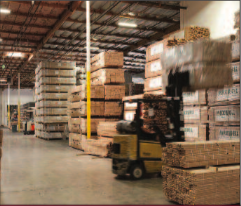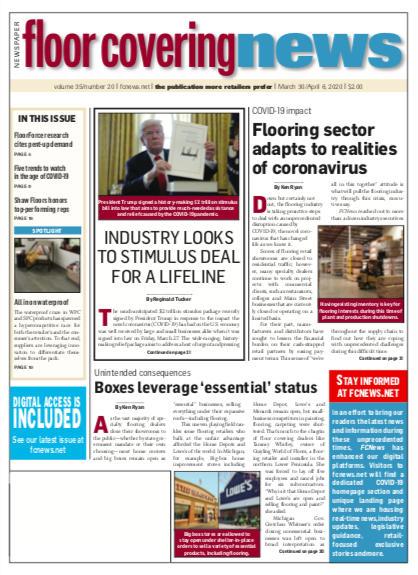
Down but certainly not out, the flooring industry is taking proactive steps to deal with an unprecedented disruption caused by COVID-19, the novel coronavirus that has changed life as we know it.
Scores of flooring retail showrooms are closed to residential traffic; however, many specialty dealers continue to work on projects with commercial clients, such as restaurants, colleges and Main Street businesses that are currently closed or operating on a limited basis.
For their part, manufacturers and distributors have sought to lessen the financial burden on their cash-strapped retail partners by easing payment terms. This sense of “we’re all in this together” attitude is what will pull the flooring industry through this crisis, executives say.
FCNews reached out to more than a dozen industry executives throughout the supply chain to find out how they are coping with unprecedented challenges during this difficult time.
Retailers seize opportunities
Scores of flooring retailers have closed their showrooms—whether ordered by their state government or voluntarily. That said, it is certainly not all doom and gloom out there for dealers. Ron Dunn, co-CEO of Alliance Flooring, told FCNews that he was pleasantly surprised to hear so many reports of members seizing opportunities to work on commercial projects in restaurants and schools that are currently on hiatus or closed.
Olga Robertson, president of the FCA Network, said she was “guardedly optimistic” at what she sees among her members. “Sales aren’t as bad through the end of March as I had anticipated, but April will be the true test,” she said.
Given the unprecedented nature of this pandemic, retailers—like the rest of us—don’t know what to expect, as there are many unknowns yet to figure out.
But hope springs eternal among so many of these entrepreneurs. “We believe when this finally winds down, business will be very good,” said John Taylor, owner of Taylor Carpet One Floor & Home, Fort Myers, Fla. “I believe people who are staying at home are going to see all the projects they want to do in their homes and make it more of a priority when they feel they can afford it.”
In hard-hit California, retail showrooms have been closed to the public but the work goes on behind the scenes. Phil Meyer of Carpet One Floor & Home, Concord, Calif., said he is manning the store in order to receive materials and facilitate installations both with the agreement of the customer and the installer. “I have been able to perform some estimates with the permission of the customer,” he said.
In Benton, Ark., Floors and More has pretty much kept to a business-as-usual schedule. “Our businesses will survive if we take proactive steps by communicating with our vendors, customers and team/staff on what they need and what the business needs,” said Carlton Billingsley, owner.
Several flooring dealers noted that because business fundamentals were solid before the virus outbreak, it can spring back like a rubber band after all is said and done. “I see our business going right back to where it was before the crisis,” said Craig Phillips, president, Carpet Country and Barrington Carpet & Flooring Design, Twinsburg,
Ohio. “However, in four to seven months we will see a slowdown on the new construction side because housing starts will be behind as sales during this time are expected to soften for our builders. If indeed this is a short- term slowdown, we see commercial and property management work not being affected. The longer the stay-at-home order is in place—and people are laid off during that time—will dictate how fast retail returns to normal.”
Installation concerns
There is a real concern among flooring dealers who rely extensively on subs for their installation jobs that these independent contractors will slip through the cracks during this crisis or seek other sources of income in the interim. The result could be making a difficult situation even worse for an industry already struggling to recruit and retain the next generation of installers. “If you want them when this is over, you need to help them now,” said Mike Foulk, owner of Foulk’s Flooring America, Meadville, Pa. “If not, I am afraid you will lose them to other things they can do for money immediately.”
Distributors

For the most, the top 20 flooring distributors surveyed by FCNews are faring pretty well. Santa Fe Springs, Calif.-based Galleher is still open at all 26 locations, although some with reduced hours. Staffers in the marketing, purchasing, customer service and sales departments are working remotely. Meanwhile, all operations-related people—warehouse employees, drivers, etc.—are still working at Galleher locations. “Business has slowed a bit in the past week but not as much as anticipated,” said Jeff Hamar, president. “We are planning for a pretty significant drop in April from our budget, with less of a drop in May and then stabilization by June. If current thinking holds, we expect a very busy Q3 and a solid Q4.”
Hamar said Galleher will be implementing a number of cost- saving initiatives for April and May that will likely touch most aspects of its operations. “Since we believe the time span will be limited, we don’t think any of our actions will impact customers nor have any long-term consequences,” he explained.
Like others, Hamar said he believes the $2 trillion federal monetary and fiscal stimulus action should go a long way to protecting workers and companies during this outbreak.
On the East Coast, Glen Burnie, Md.-based Haines is currently open. However, 10 states in which it does business are currently in a sheltered situation and have limitations. “Our business is open, but a lot of our people are working from home,” said Hoy Lanning, CEO. “All of our salesforce is using technology to communicate with customers and participate in meetings. We are an essential business. The problem is we can make deliveries, but a lot of our customers are closed.”
In the Midwest, distributors for the most part are working remotely when they can while relying on technology to keep tabs with customers and orders. “We have as many people working remotely from home as possible,” said Torrey Jaeckle, vice president of Jaeckle Distributors, Madison, Wis. “This includes many office personnel, as well as customer service representatives. The technology was already in place to facilitate that, and we immediately implemented it as widely as possible soon as the COVID-19 pandemic ramped up.”
In Romeoville, Ill., FlorStar Sales is engaged in limited operations based both on general medical advice as well as legal directives in the many different
jurisdictions in which it operates. “In some states, shelter orders appear to allow continued distribution of health-care related and sometimes construction-related goods,” said Scott Rozmus, CEO. “In others, the orders are stricter, so we have shuttered operations there.”
Jefforsonville, Ind.-based Gilford- Johnson Flooring, which has nine distribution centers servicing Alabama, Florida, Georgia, Indiana, Kentucky, Ohio and Tennessee, as well as parts of North Carolina, South Carolina and Virginia, remains fully open and operational. Reps are still making sales calls where appropriate on a dealer-by-dealer basis.
“They’re using this time for updating displays, educating dealers and setting up new Egger laminate displays—only at locations where dealers are comfortable having someone come into their store,” said Bill Schollmeyer, president. “On the commercial side, there’s much less face-to-face contact, so our commercial reps are pretty much working from home, working on quotes and helping to facilitate shipments. Internally, we’ve got several ‘resistance-challenged’ personnel working from home and are really leaving it to the employees as to who prefers to work from home. Business-wise, March is actually going to wind up as a decent month in terms of actual sales and pending open orders. We’ll see how April/May shake out.”
Manufacturers ease terms
Much to the appreciation of flooring retailers who are impacted by dwindling cash-flow, major manufacturers, including Mohawk, Shaw, Engineered Floors, Phenix and others have jumped in to ease payment terms. Typically, the mills are extending standard net 30-day terms to net 60-day terms for all new and unshipped orders effective through May 31, 2020. Terms return to net 30 days for shipments after July 1, 2020.
“Manufacturers and distributors have been very supportive extending terms through July 1,” Robertson said, adding, “right now we have a demand issue, not a supply issue.”
Suppliers are facing some of the same issues as their industry partners, of course, namely cur- tailed or suspended production. Mohawk said most of the facilities that have suspended operations are satisfying customer demand by delivering products from existing inventories.
On March 31, Engineered Floors—citing a continuing effort to lessen the impact of COVID-19, decided to stop manufacturing operations for one week. However, its sales, administration and distribution facilities remained open.

